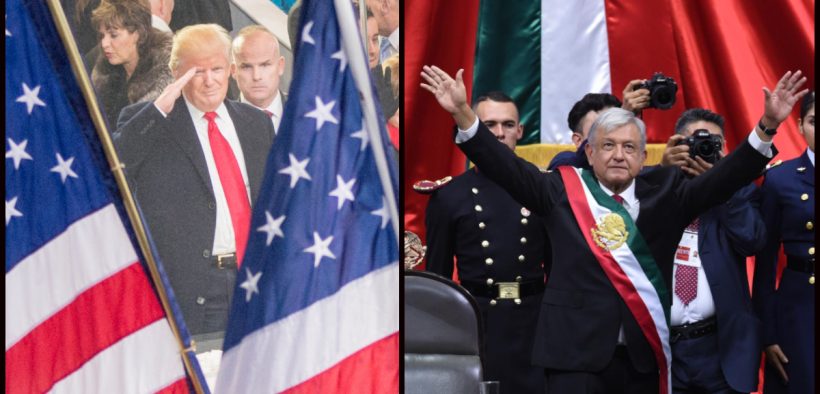Trump Gambles US Economy With Incremental Mexico Tariffs

Mexico is one of the U.S.’ biggest trading partners, and the new Mexico tariffs complicate the president’s goal of creating a revised trade pact between the U.S., Canada, and Mexico.
President Trump announced new tariffs on Mexican goods in a series of tweets Thursday, hoping to pressure the U.S.’s southern neighbor to devote more resources to restricting the flow of migrants across the border. While the White House released a statement explaining the tariffs were purely related to immigration, President Trump tweeted Friday that they were also a response to drug trafficking and the U.S. trade deficit.
“Mexico has taken advantage of the United States for decades,” the president tweeted. “Because of the Dems, our Immigration Laws are BAD. Mexico makes a FORTUNE from the U.S., have for decades, they can easily fix this problem. Time for them to finally do what must be done!”
The specifics of President Trump’s demands on Mexico are somewhat unclear. On Sunday, Department of Homeland Security head Kevin McAleenan said the United States wants to see Mexico increase efforts to secure the Mexican-Guatemalan border, crackdown on organizations that provide help to traveling migrants, and officially designate Mexico as “a safe place,” which would remove asylum seekers’ entitlement to hearings in the United States. Mexico has been hesitant to enact the third demand, as violent crime and narco-trafficking plague the country.
Mexico Tariff Would Increase
The plan would begin on June 10, imposing a five percent tariff on all Mexican goods. If Trump isn’t satisfied with Mexico’s efforts to curb migration, the tax would increase to 10 percent on July 1. If the president remains unsatisfied, it would go up to 15 percent on August 1. On September 1, the tariff would reach 20 percent, and on October 1, it would level off at 25 percent, where it would remain in the absence of a bilateral agreement between the countries.
Despite the Trump administration’s hardline immigration policies, May saw the highest amount of border crossings in 12 years. But as Vox’s Matthew Yglesias points out, spring is normally the high-point for border crossings, while migration in the summer is traditionally low. Trump would likely be able to declare the tariffs a victory even in the absence of a major policy shift from Mexico because of seasonal differences in migration.
Mexican President Andrés Manuel López Obrador struck a conciliatory tone on Trump’s tariff threats, saying he expected a “good result” from Foreign Minister Marcelo Ebrard’s upcoming visit to Washington on Wednesday.
“The main thing is to inform about what we’re already doing on the migration issue, and if it’s necessary to reinforce these measures without violating human rights, we could be prepared to reach that deal,” Lopez Obrador said, adding that he had an alternative “plan” to protect his country’s economic stability in case the full tariffs are applied.
Economic Impact of Mexico Tariff
Many economists fear the president’s aggressive trade strategy could lead to a slowdown in the global economy. Three weeks ago, the Trump administration imposed tariffs on $200 billion of Chinese goods, and the president has threatened auto tariffs on Europe and Japan.
“We don’t know what straw will break the camel’s back here, but Trump is looking like he wants to try to find out,” Timothy Duy, an economist at the University of Oregon, wrote on Friday.
Mexico is one of the U.S.’ biggest trading partners, and the tariffs complicate the president’s goal of creating a revised trade pact between the U.S., Canada, and Mexico. Companies like Ford and General Motors have large parts of their supply chains based in Mexico, and the tariffs would negatively impact their operations.
“Auto parts in particular go back and forth several times before they get to the final product, and if each time you have to add a tax to that, it’s going to compress margins and could even put some smaller firms out of business,” Megan Greene, global chief economist at investment firm Manulife, told Politico.
Business groups like the Association of Equipment Manufacturers and the Business Roundtable sharply criticized the Trump administration’s trade strategy.
“Business Roundtable strongly urges the administration not to move forward with these tariffs, which would create significant economic disruption and tax U.S. workers, farmers, consumers and businesses,” the group said in a statement.
On Fox News Sunday, Chief of Staff Mick Mulvaney said President Trump was “deadly serious” about implementing the tariffs, saying, “I fully expect these tariffs to go on to at least the 5 percent level on June 10.”
Mulvaney also said he did not want to see 25 percent tariffs imposed on Mexican imports.
“We sincerely hope it does not come to that,” he said. “We actually have some level of confidence that the Mexican government will be able to help us.”















